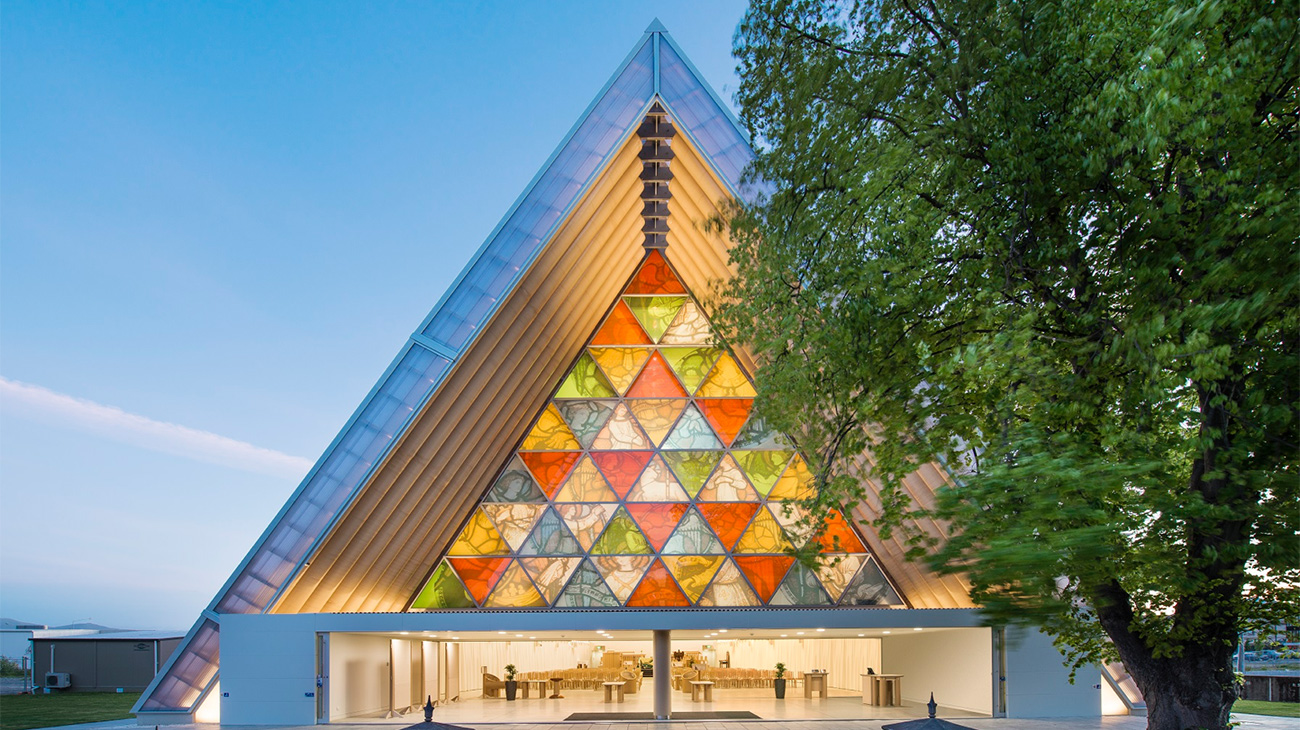Shigeru Ban: Works and humanitarian activities
Shigeru Ban of Shigeru Ban Architects lectures on his diverse range of work in this Current Work event.
June 17, 2015
7:00 p.m.

Shigeru Ban Architects | Cardboard Cathedral, Christchurch, New Zealand, 2013. Credit: Stephen Goodenough
Current Work is a lecture series featuring leading figures in the worlds of architecture, urbanism, design, and art.
Shigeru Ban of Shigeru Ban Architects will present his work in a public lecture.
With a portfolio that spans diverse scales, from refugee housing and other temporary structures to houses, commercial structures, and cultural facilities, Shigeru Ban’s work is united by structural innovation, creative use of unconventional building materials, and environmental sensitivity. The 2014 winner of the Pritzker Prize, Ban was lauded by the jury for “his respect for the people who inhabit his buildings, whether victims of natural disaster or private clients or the public … always revealed through his thoughtful approach, functional plans, carefully selected appropriate materials, and the richness of the spaces he creates.”
Shigeru Ban founded Tokyo-based Shigeru Ban Architects in 1982. The firm has since expanded to New York and Paris. He became a consultant to the United Nations High Commissioner for Refugees in 1995 and founded the NGO Voluntary Architects’ Network in the same year to support disaster relief. Notable projects include: Japan Pavilion, Expo 2000, Hanover; Nomadic Museum, New York; Seikei University Library and Nicolas G. Hayek Center, both in Tokyo; Paper Temporary School/Hualin Elementary School, Chengdu; Centre Pompidou-Metz; Container Temporary Housing, Onagawa, Japan; Paper Partition System 4 for Evacuation Facilities, East Japan; Cardboard Cathedral, Christchurch, New Zealand; Aspen Art Museum; and Oita Prefectural Art Museum, Oita, Japan.
Ban was a professor at Keio University from 2001 to 2008. He is an honorary fellow of the American Institute of Architects and the Royal Architectural Institute of Canada; honorary member of the Japan Institute of Architects; le grade commandeur of l’Ordre des Arts at des Letters in France; and recipient of the International Fellowship of the Royal Institute of British Architects. He received his BArch from the Cooper Union.
Shigeru Ban has also been recognized internationally for his architectural design and relief efforts. He is a recipient of this year’s World Economic Forum Crystal Award; the Asahi Prize in 2014; and the Arnold Brunner Memorial Prize of the American Academy of Arts and Letters in 2005.
This lecture is co-sponsored by The Irwin S. Chanin School of Architecture of The Cooper Union.
Support



Explore
Tokyo’s pantry: Tsukiji and the commodification of market culture
Alice Colverd and Alexander McLean write about Tokyo’s Tsukiji fish market, which the city plans to relocate in time for the 2020 Olympic games.
Interview: Williamson Chong Architects
Donald Chong, Betsy Williamson, and Shane Williamson marry traditional materials and construction methods with emerging technologies.
Transversal modernity: Spatial discourse in architectural paper projects in Iran, 1960–1978
Shima Mohajeri examines a 1973 design proposal for a civic center in Tehran by Louis Kahn.
